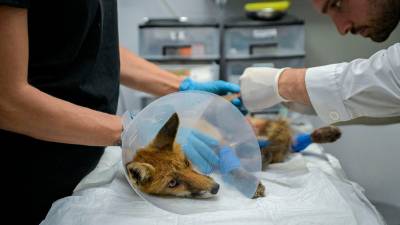ATHENS: A severely burned tortoise struggles in an Athens animal clinic despite heavy painkillers, becoming another victim of climate change devastating Greece’s wildlife.
Veterinarian Grigorios Markakis described how volunteers found the tortoise depressed and gasping from smoke inhalation when they brought it to the clinic.
He explained that even with current improvement, the prognosis remains poor because internal organ damage likely matches the extensive external shell burns.
The 28-year-old veterinarian cares for various injured wildlife including hedgehogs, snakes and storks at the first aid station of Greek wildlife protection group Anima.
This non-governmental organisation has experienced a significant increase in animal admissions primarily due to climate change impacts according to scientific assessments.
Greece endured multiple major forest fires this summer during high temperatures particularly around Athens and the western Peloponnese region.
Official government reports indicate approximately 45,000 hectares have burned across the country this year alone.
Nikos Georgiadis from World Wildlife Fund Greece stated that these fires have become more difficult to control while destroying critical habitats and displacing wildlife.
He emphasised that prolonged droughts, rising temperatures and forest degradation collectively reduce survival resources for numerous species.
Anima staff member Anna Manta reported receiving increasing numbers of animals affected by extended heat conditions.
She noted that many animals become exhausted or abandon nests prematurely while birds essentially get roasted alive from extreme temperatures.
The organisation admitted 1,586 animals during July’s heatwave with temperatures exceeding 40 degrees Celsius and 2,125 animals during June.
Manta revealed that this year’s June numbers exceeded last year’s figures by nearly 300 animals despite previous expectations.
The centre has received numerous emaciated and exhausted young vultures struggling to find adequate water sources.
Manta explained that vultures in Crete have been drinking seawater which poisons them since their bodies cannot process salt content.
Medical treatment involves several days of medication and fluids followed by outdoor cage socialisation before wild release after six months.
Markakis highlighted that climate change also affects microorganisms and parasites by extending their transmission periods.
A long-eared owl perched on a computer monitor observed clinic activities including new arrivals like a cat-attacked quail and car-hit fox.
Georgiadis attributed such incidents to habitat degradation and urban expansion into forest areas forcing wildlife into cities.
Markakis shared his magical experience of successfully treating and releasing an injured bear cub back into its natural habitat. – AFP
